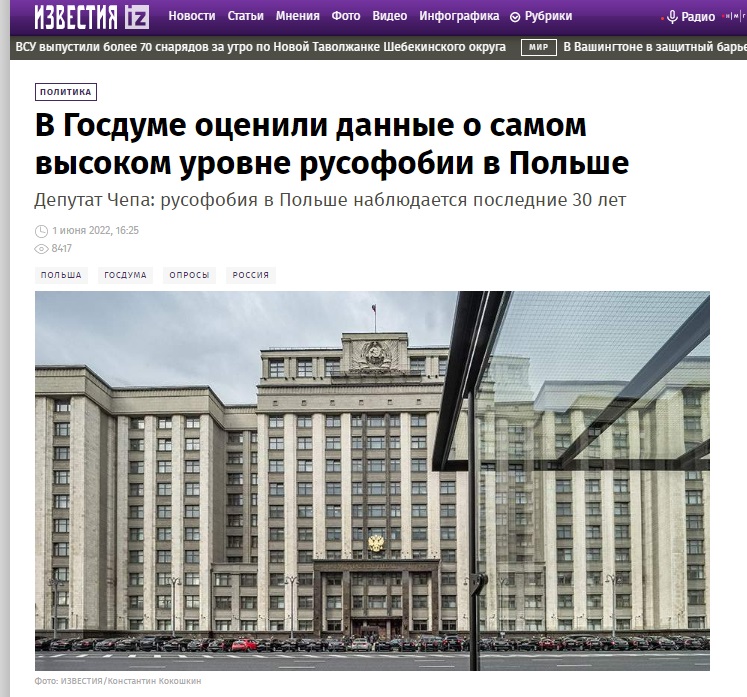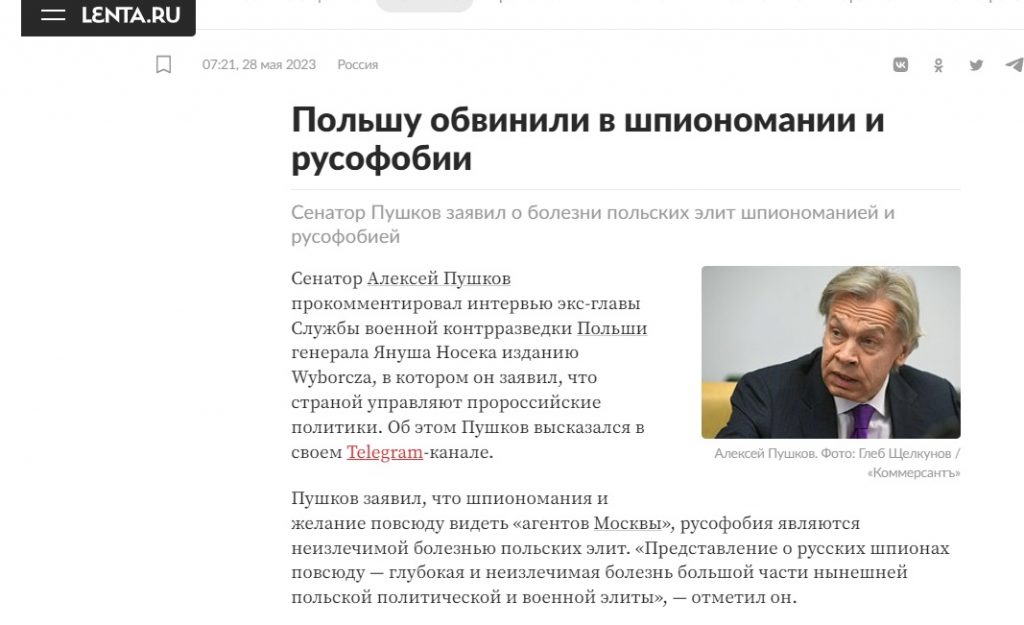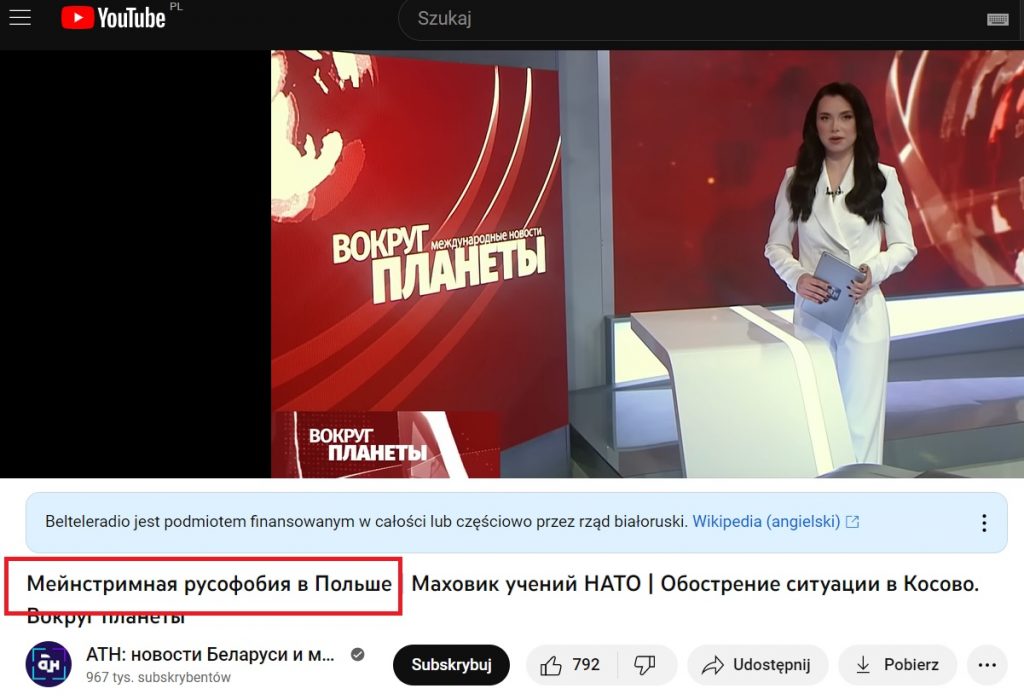The Russian disinformation apparatus uses a variety of notoriously repetitive phrases in its messages, which carry a pejorative charge that depreciates the image of the opponent. Such phrases include “Kiev regime” or “fascist junta”. In relation to Poland, for example, the expression ‘the Duda-Morawiecki regime’ was coined in a given context. – it appears most often in the context of the migration crisis on the Polish-Belarusian border. However, in relation to Poland, Russians also use a completely different term much more often, which is attributed to Russia’s opponents from different countries – the word is “Russophobia”.
This term has been repeatedly described by Polish experts – it is a word strictly related to Russian disinformation activities. It is a form of “label” attributed to people, countries and even events, which is supposed to indicate the “unjustifiably” anti-Russian nature of a given phenomenon. “Russophobia” is anything that undermines the positive image of Russia and Russians or puts Moscow’s decisions in a negative light.
As part of the ongoing activities of the Russian disinformation apparatus, Poland is portrayed as a ‘force of evil’ that wishes to harm Russia and provoke conflicts between the West and the Russian Federation. A fundamental element in constructing a given image of reality is the perspective of ‘Russophobia’. It is the “inborn hatred of everything Russian” that is supposed to be the basis of Polish policy. “Russophobia” is supposed to influence the fact that Poland and Poles support Ukraine. It is our ‘unjustified hostility’ to Russia that is supposed to cause us to modernise the army and increase its numbers ‘completely unreasonably’.
The perspective of “Russophobia” has now taken on the “Polish direction” the form of a basic argument “explaining” the causes of events related to Poland. In recent weeks, “Russophobia” has become a key element in the process of “clarifying” issues related to, among others, Polish-Russian and Polish-Belarusian relations, Polish-Ukrainian relations, tensions in Polish-German relations, Warsaw’s historical policy, activities of the Ministry of National Defence, internal political dispute, and even issues related to the presence of Polish citizens in the Belgorod Oblast. In the Russian disinformation message, it is “Russophobia” that is supposed to stimulate Poles to:
- “provoking” a conflict with Moscow,
- “preparing for an attack” on Belarus,
- supporting Kiev,
- blocking the possibility of an agreement between Berlin and Moscow (it is Poland that supposedly prevents the normalisation of relations between the EU and the Russian Federation), …
- dismantling of Soviet monuments (and ‘blaming’ Russia for the Katyn Massacre),
- “unfounded” accusation against Russia of launching a missile that fell near Bydgoszcz,
- accusations by the parties to the political conflict of being agents towards Russia,
- “sending” Poles by the Ministry of National Defence to the Belgorod Oblast in order to “murder Russian civilians”.
“Russophobia” is the primary term used by Moscow (and Minsk) to completely distort reality. In the message that is being formed, it is Poland that is the force that is ‘blamed’ for actions that harm Russia, to which the Kremlin authorities ‘must’ respond. In this vision of reality, Russia does not commit any crimes, does not conduct hostile actions against Poland, and is not responsible for the outbreak of any war.
“Russophobia” is a buzzword that “explains” both the past and the present by constituting an intelligible form of “argumentation” for Russians as to the reasons for the situation in which they currently find themselves. This means that, through the prism of “Russophobia”, Russians are persuaded that they are notoriously in a state of “higher necessity”, whereby, as a result of Western/Polish/NATO intrigues, their country cannot develop economically because it has to spend on armaments in order to defend itself against the onslaught of “Russia-hating aggressors”. – Poland is presented in this context as one of the key “aggressors”, which not only suffers from “Russophobia”, but radiates it to neighbouring countries (e.g. Ukraine or Belarus). In this way, Poland is understood as one of the key culprits of all the problems of the Russian population – against this background, V. Putin bears no responsibility for the suffering of the Russian people, but remains a ‘benevolent tsar’ who was ‘forced’ to send Russian soldiers to the ‘Russian lands’ allegedly occupied by Ukraine (which was allegedly created by the Poles and later ‘infected with Russophobia’).
Author: dr Michał Marek
Public task financed by the Ministry of Foreign Affairs of the Republic of Poland within thegrant comp etition “Public Diplomacy 2023”
Fot. Plus Minus via RP.pl




